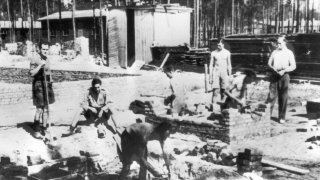
Observances were held in Poland on Sunday to mark the 80th anniversary of the “Great Escape,” an ingenious act of defiance during World War II in which 76 prisoners of war tunneled out of a German prisoner-of-war camp into a snowy forest.
A solemn roll call of remembrance was held in Żagań, where the former POW camp is now a museum, according to state broadcaster TVP World. Soldiers belonging to Poland’s 11th Armored Cavalry Division as well as American troops stationed there attended the event, the broadcaster said on its website.
Most of the soldiers who escaped from Stalag Luft III on the night of March 24, 1944, faced a tragic end. Only three made it to safety. The others were recaptured and 50 of them were executed.
Nevertheless, the event became known as the “Great Escape,” credited with embarrassing the Germans, and celebrated in a 1963 film starring Steve McQueen that took liberties with the facts but became the stuff of legend.
Get Tri-state area news and weather forecasts to your inbox. Sign up for NBC New York newsletters.
More recently the escape was featured in an episode of the American war drama miniseries "Masters of the Air" on Apple TV+.
A new exhibition at the U.K. National Archives in London also pays tribute to the escapees.
The prisoners spent a year secretly digging three tunnels named Tom, Dick and Harry. The Germans discovered the first tunnel but the other two remained.
U.S. & World
The plan was to get 200 men out through tunnel Harry, but on the night of the escape, the first man who emerged realized the tunnel did not extend as far beyond the wire as they had anticipated. Only 76 made it out before a guard noticed footprints in the snow.
Three men — two Norwegian pilots and a Dutch one— were the only ones who successfully escaped.
Adolf Hitler was so incensed by the escape that he ordered the 73 recaptured men executed, and the Nazis eventually settled on killing 50 — all in violation of the Geneva Conventions on the treatment of war prisoners.
After the war, the murders of the allied airmen were part of the Nuremberg trials and several Gestapo officers were sentenced to death.



